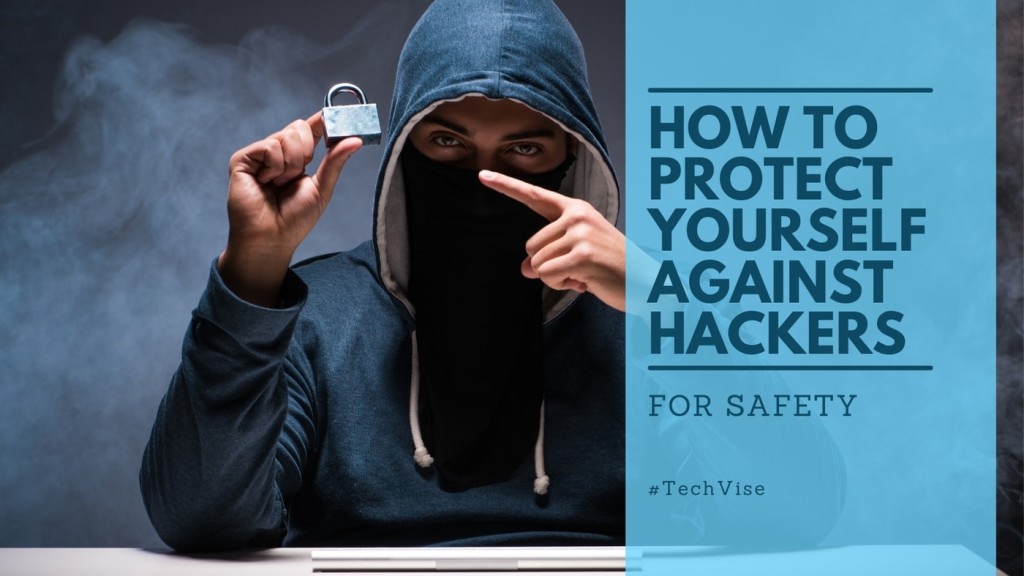Rule of thumb in times like these is to protect yourself.
We have been doing a lot on cyber security here on TechVise lately, and today we would like to turn our focus once again on your digital well-being.
In this modern digital age, one of the biggest concerns of any frequent internet user is having their private information stolen by hackers. It seems like every day there is a new story of major security compromises and stolen financial information.
While such security breaches are hardly under your control, hackers almost always use low-level information gathered from normal people to make their way into bigger systems. And this is something that can easily be avoided on an individual basis. This is called Digital Immunization.
Protect Yourself
Here is our list of the top three ways on how to protect yourself against hackers.
Passwords
Probably the most effective way to protect yourself from hackers is to have a complex passwords.
A simple 8 character password with one letter and a capital letter doesn’t cut it anymore. Your password should look less like TechVise1 and more like T3[HV!5E01101.
Former NSA contractor Edward Snowden suggests using passphrases, which are much longer security measures.
You also shouldn’t use the same password more than once, and you should change all of your passwords once a month or so.
It seems like a lot, I know, but it is necessary to keep your online accounts safe and secure. You could also use a password manager to keep up with your passwords.
Two-Factor Authentication (2FA)
You should also set up two-step authentication for your accounts where possible. By doing so, you are making it that much harder for hackers to access your account, plus you will be notified if anyone tries to.
Make it a practice to generate codes from apps like Microsoft Authenticator or Google Authenticator.
Browser Security
Not all browsers are created equal when it comes to privacy and security. While Google Chrome is popular, it’s known for tracking and selling user data. Then there is Google Search itself, which relys on weird algorithms and the company Alphabet tracks every app you use of theirs.
To protect yourself from trackers and breaches, consider switching to more secure alternatives.
Microsoft Bing: For those looking for an alternative to Google Search, Microsoft Bing offers a more privacy-conscious experience. While it does collect some data to improve search results, it offers clearer privacy controls and options to limit data collection. Bing also integrates with Microsoft Rewards, allowing users to earn points for searches that can be redeemed for various rewards.
Mozilla Firefox: Firefox is a great option for those who prioritize privacy. It offers robust security features and a strong stance on user privacy. You can further enhance your privacy by installing extensions like Privacy Badger and uBlock Origin.
Brave: Brave is another excellent choice. It blocks ads and trackers by default and offers features like HTTPS Everywhere and script blocking. Brave also has a built-in Tor feature for anonymous browsing.
DuckDuckGo: For search engine privacy, DuckDuckGo is a strong alternative to Google Search. It doesn’t track your search history or sell your data to advertisers. DuckDuckGo also offers a privacy-focused browser for mobile devices.
Microsoft Edge: Microsoft Edge, which uses the same Chromium engine as Chrome, has improved significantly in terms of privacy and security. It includes tracking prevention features and integrates with Microsoft Defender SmartScreen to protect against phishing and malware.
Visit Secure Websites
There are also less obvious things to consider. For instance, do you know how to check and see if you’re on a secure connection?
In your URL, the beginning of the code should read https://www… If it does not read this and instead reads http://, you are on an insecure connection.
This simply means all of your information is easily accessible for anyone out there looking to ‘sniff’ out the information.
Protect yourself by verifying the URL if you’re on any site where anything more than your email address is being taken.
Software Updates
Something that is most often overlooked is software updates.
Yes, they can be tedious and they steal 15 minutes or so from your life, but they are critical to avoid being targeted by hackers. These updates contain the latest security features and will help keep hackers out of your information.
This also includes updating drivers in computer.
Use a VPN
If you don’t know this already, public WiFi connections are dangerous.
Being on a network that anyone can access opens you up to all kinds of security dangers. On these networks, anyone can connect at the same time as you and then steal any or all information off from your computer or phone. The scariest part is it’s rather simple to do. It doesn’t even take an expert hacker.
Instead, use a VPN to ensure all your internet activity is secure, making it all the more difficult being targeted by hackers. Some reliable VPN services include Surf Shark, NordVPN, ExpressVPN, and CyberGhost.
Otherwise, treat public WiFi like public restrooms and avoid them at all costs.
Back Up Your Data
Regularly backing up your data ensures that you won’t lose important information if your device is compromised.
This can be done using external hard drives or cloud storage solutions. Popular options for cloud storage include Dropbox, Box, Microsoft OneDrive and Google Drive.
For local backups, you can use software like Acronis True Image or Macrium Reflect, which provide comprehensive backup solutions.
Monitor Logins
Keeping an eye on your login activity can help you detect unauthorized access.
Most online services, like Google, Facebook, and many banking apps, offer the ability to view recent login activity. If you notice any suspicious logins from unknown devices or locations, immediately change your password and review your account security settings.
Email Security
Phishing attacks are one of the most common methods hackers use to gain access to your information.
Be cautious with emails from unknown senders, especially if they contain links or attachments. Verify the sender’s email address and look out for signs of phishing, such as poor grammar or urgent requests for personal information.
Email services like Gmail and Outlook often have built-in phishing detection and spam filters, but it’s crucial to stay vigilant.
You can even go a step further and protect yourself by using Secure Encrypted Email.
Social Media
Be cautious about the personal information you share on social media.
Hackers can use details like your birthdate, pet names, or even your mother’s maiden name to answer security questions and gain access to your accounts.
Adjust your privacy settings to limit the visibility of your posts to only trusted friends and avoid sharing sensitive information publicly.
Physical Security
Ensure your devices are physically secure.
Don’t leave your laptop, smartphone, or tablet unattended in public places. Use biometric locks, such as fingerprint or facial recognition, where possible.
Additionally, enable the Find My Device feature on your phone or laptop, which allows you to locate, lock, or erase your device remotely if it gets lost or stolen.
Antivirus and Anti-Malware Software
Having robust antivirus and anti-malware software is essential for protecting your devices from threats.
Protective Software like Bitdefender, Norton 360, and Malwarebytes offer comprehensive protection against viruses, malware, ransomware, and other cyber threats. Regularly update these programs and run scans to detect and remove potential threats.
With these strategies in place, you can significantly reduce your risk of falling victim to hackers. Remember, cybersecurity is an ongoing process, and staying informed and vigilant is key to protecting your digital life. Happy browsing!


